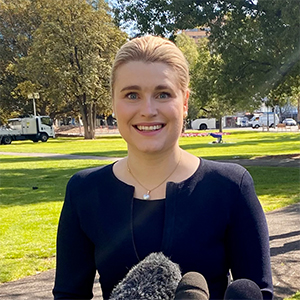Emily Kirkpatrick
 Dr Emily Kirkpatrick
Dr Emily Kirkpatrick
On the COVID frontline
It's mid-afternoon and Dr Emily Kirkpatrick is fresh from yet another media appearance, but her voice shows no signs of fatigue. Upbeat and polished, she has become well accustomed to the demands of interviews during the past 18 months.
“Every day is an exciting adventure,” she says. “I go to bed wondering what tomorrow will hold and never know what I will wake up to. But I have a great team to work with and this is a job where I feel I can make a real difference.”
Emily was working as a GP in Adelaide in early 2020 when a deadly virus called COVID-19 was first detected in Australia. Within weeks she was seconded to South Australian Health, to liaise with GPs as part of her government’s primary healthcare response. Within months she’d been promoted to deputy chief public health officer and then deputy chief medical officer. Now she’s also heading up SA’s quarantine program.
“I spend most of my time working on SA Health’s COVID response,” Emily says. “It’s drawn on my understanding of primary care, public health and also medical administration. There’s quite significant community and stakeholder engagement, particularly with clinicians and doctors, plus the press conferences and media interviews, which help to keep the community informed. It’s an incredibly challenging time for everyone.”
And certainly a far cry from the junior doctor who graduated from UNE at the end of 2012, as part of the first cohort to complete the Joint Medical Program with the University of Newcastle. “UNE was a great opportunity to see how rural medicine and primary care can work effectively to delivery health outcomes,” Emily says. “It laid the foundations for the further education I have pursued outside pure clinical medicine. I also loved campus life and living in Armidale; it was a great learning experience for me in terms of developing myself as a well-rounded individual.”
After UNE, Emily studied skin cancer medicine, paediatrics, women’s health and public health, while pursuing a fellowship of general practice. “I’ve just finished my fifth postgraduate qualification and now have 32 initials after my name,” she says with a laugh. “I returned to UNE in 2019 to do a Graduate Certificate in Health Professional Education, to improve my understanding of clinical governance, medical education and health leadership, because UNE’s delivery of education is so innovative.
“The online, problem-based model – with access to lecturers who work across various areas nationally – could be tailored to my individual needs. That was really important for a busy person like me.”
As challenging as the pandemic has been for health professionals across the country, Emily believes it has also afforded great opportunities for career advancement and improvements. “The chance to integrate primary care and medicine into a state health department at such rapid speed would never have come about for me if not for COVID-19,” she says. “We’ve had this opportunity to revisit and change processes, to be adaptive in the way we deliver health care, and that’s probably the thing I find most exciting about my current role.
“The use of telemedicine and virtual options has undoubtedly helped to reduce risks to the community. We’ve seen great progress across the nation in terms of developing new models of healthcare delivery and now there’s no excuse for not adapting. The quarantine program I lead is the perfect example, where we can quarantine people using facial recognition and phone compliance mapping and even provide health care within hotels.”
The crisis has certainly generated new appreciation for our healthcare workers, both on the frontline and those working behind the scenes, like Emily.
“The understanding of what public health is about and what drives health initiatives and change is now front and centre,” she says. “Chief health officers and deputy health officers have been working on immunisation, strategy and policy, and are now on the TV and radio every day, really driving change but also aiming for stability, working to make things as safe as possible for the community. There has been a dramatic shift in the understanding of what public health is about and what the role of the chief health officer is within each state and territory. It’s happened nationally and globally, and puts us in a much better position moving forward.”
Emily believes the pandemic will ultimately have far-reaching impacts on healthcare delivery, especially for vulnerable and Indigenous communities. “We will need to be more innovative, more aware of infection control and the risk of a future pandemic,” she says. “There’s a lot to be done in evolving the healthcare system and COVID will provide us with that opportunity for remodelling.”
Although case numbers in SA currently remain low, there is a very real and constant danger of COVID seeding and spread across the state. “We don’t know where COVID will take us, but currently we have no community transmission that we are aware of, and our fingers are crossed that that will continue,” Emily says. “If you look at the rollout plan with vaccination targets, there is no other choice now but to be prepared. We cannot keep borders between the states and internationally closed forever.”

